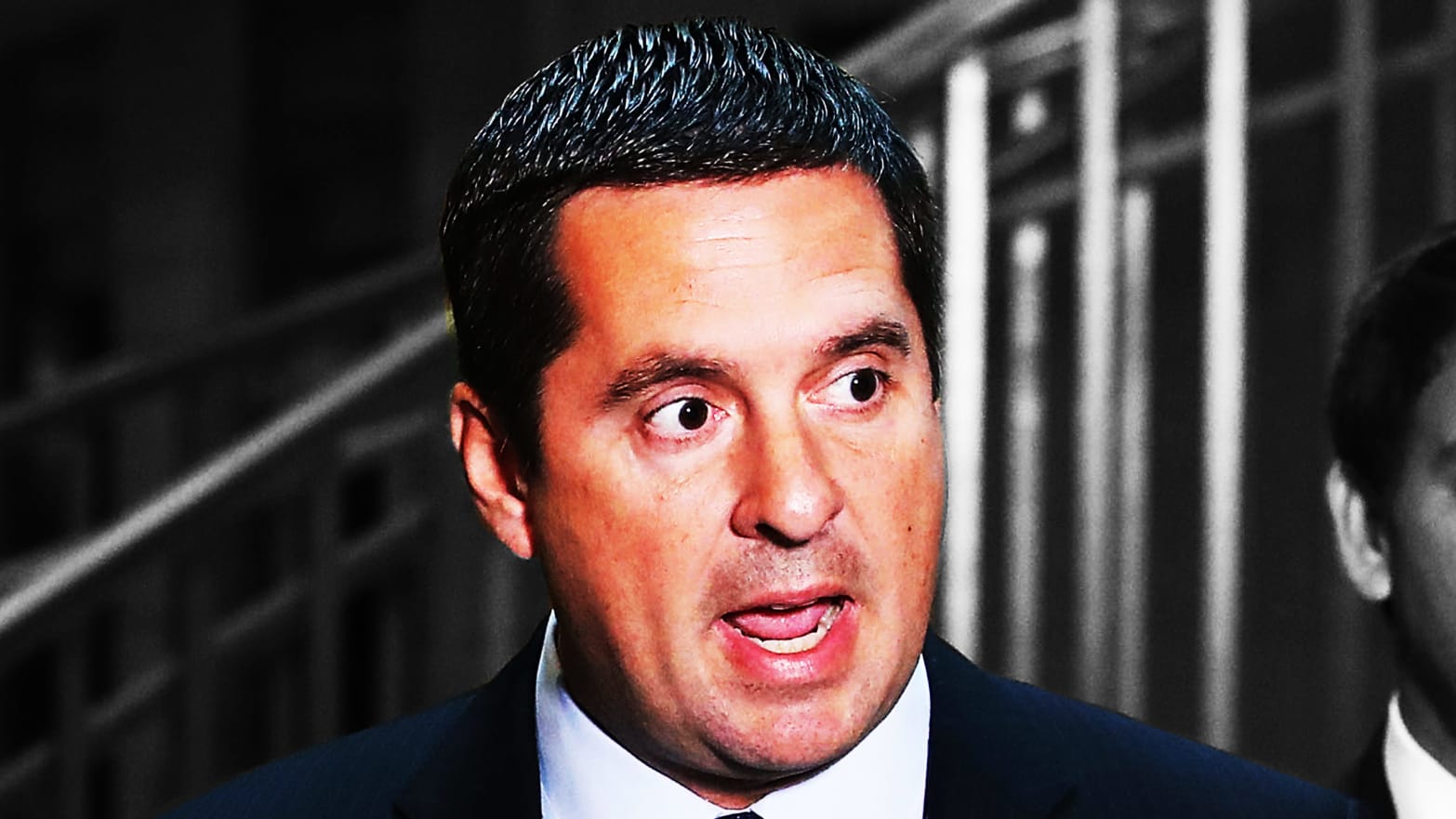The Republican chairman of the House intelligence committee refused to answer when a colleague asked him if he had coordinated his incendiary surveillance memo with the White House, The Daily Beast has learned.
During Monday’s contentious closed-door committee meeting, Rep. Mike Quigley, a Democrat, asked Nunes point-blank if his staffers had been talking with the White House as they compiled a four-page memo alleging FBI and Justice Department abuses over surveillance of President Trump’s allies in the Russia probe.
According to sources familiar with the exchange, Nunes made a few comments that didn’t answer the question—initially saying that “as far as I know,” he did not collaborate with the White House on the memo—before finally responding that he wouldn’t answer it.
The transcript of the meeting, released the day after this story was initially published, shows Quigley asking “with the greatest respect” if the White House aided Nunes in any way, including consulting with him on the memo.
Nunes initially replied: “I would just answer, as far as I know, no.”
He continued, “And I would just also say that we are well aware the minority has not wanted to conduct this investigation by the public opposition to the subpoenas that we issued back in August that were clearly looking into matters of FISA [Foreign Intelligence Surveillance Act] abuse and other matters.” Quigley asked Nunes if that meant “none of the staff members that worked for the majority had any consultation, communication at all with the White House?”Nunes shut Quigley down: “The chair is not going to entertain–” after which Quigley yielded.
Spokespeople for Nunes and for the White House did not immediately respond.
Now that the committee Republicans voted to release the memo, it has been reportedly delivered to the White House. Under congressional rules, Trump has four more days to decide if he will assent to the memo’s public release.
Quigley’s question harkened back to Nunes’ history of surreptitiously working with the White House to deflect from the myriad inquiries into possible coordination between Trump’s associates and the Kremlin.
In March, a day after then-FBI Director James Comey confirmed the bureau was investigating that prospect, Nunes claimed he had seen alarming information indicating Trump advisers had been swept up in surveillance. Nunes said he had seen “dozens of reports” supporting his claim, which appeared to substantiate the president’s baseless claim that the Obama administration had wiretapped Trump Tower.
But Nunes did not reveal that senior White House officials had provided him with the information when he made a late-night trip to the White House. Nunes then lied to Bloomberg’s Eli Lake to conceal the White House’s role.
Backed by House Speaker Paul Ryan, Nunes withstood Democratic demands for him to recuse himself from the committee’s Russia probe. Instead, he formally placed the inquiry in the hands of fellow committee Republicans Mike Conaway and Trey Gowdy while he underwent a House ethics committee investigation.
But Nunes remained in an influential position within the committee, using his chairman’s prerogative to unilaterally subpoena to Trump targets like the Fusion GPS firm. And now that Nunes is out from under the ethics committee’s scrutiny, he has intensified his moves to deflect blame from Trump.
His four-page surveillance memo has now far overshadowed the committee’s Russia investigation. As The Daily Beast first reported, it names Deputy Attorney General Rod Rosenstein, former FBI Director James Comey, and retiring Deputy Director Andrew McCabe. Every Democrat on the House intelligence committee has said Nunes’ memo manipulates the intelligence behind the surveillance request in order to exculpate Trump.
“A misleading set of talking points attacking the FBI...yet another desperate and flailing attempt to undermine Special Counsel Mueller and the FBI,” Democrats characterized it in a Jan. 19 statement.
The New York Times reported this week that Rosenstein this spring signed off on renewing a surveillance warrant on Trump campaign aide Carter Page—who had previously passed documents to a Russian spy—indicating that even Trump appointees saw a sufficient basis for a counterintelligence investigation into Page.
But Rosenstein, who oversees special counsel Robert Mueller’s investigation of Trump’s circle and Russia, is specifically named in Nunes’ memo—and has become a right-wing target of opportunity. After Nunes won a vote on Monday to declassify his memo, the Fox News commentator Jeanine Pirro said on Sean Hannity’s show that the alleged abuses in the memo merit a special prosecutor, “not Rod Rosenstein, who right now is in the middle of all this.”
Democrats are warning that Pirro’s sentiment reflect the true purpose of Nunes’ memo: to provide a pretext for firing Mueller or his allies in the Justice Department and the FBI; or to have a ready-made narrative to undermine any legal move Mueller ultimately makes against Trump. Mueller is reportedly now seeking to interview Trump personally but it is unclear if Trump’s lawyers will assent.
Mark Warner, the top Democrat on the Senate intelligence committee, tweeted Wednesday that Nunes’ memo is “a partisan sham cooked up to undermine the FBI, DOJ, and the Mueller probe. House Republicans are playing a very dangerous game.”
It is also unclear if the House intelligence committee’s Russia investigation will go anywhere. It has not held an open hearing since Nov. 1, and now Nunes has opened a murky investigation into the FBI and Justice Department itself—one that Nunes used on Monday to dismiss law enforcement concerns about releasing his memo.
Nunes’ Democratic counterpart, Rep. Adam Schiff of California, pledged Monday night that the Russia inquest would continue, and announced that Steve Bannon, the former White House chief strategist, would testify on Wednesday. But since then, a Democratic staffer confirmed to The Daily Beast, Bannon’s appearance has been postponed.
Editor’s note: This piece initially quoted Nunes as responding to Quigley by saying “I’m not answering.” While the substance of his remark was the same, the initial quote was inaccurate, as the meeting transcript released post-publication shows. The Daily Beast regrets the error.


